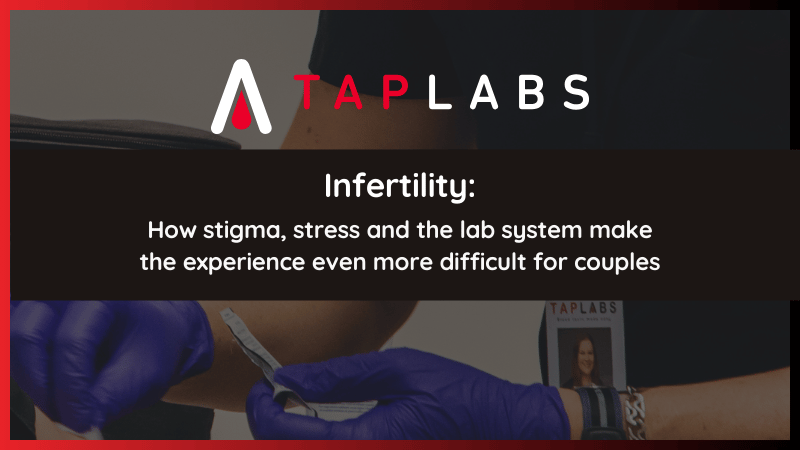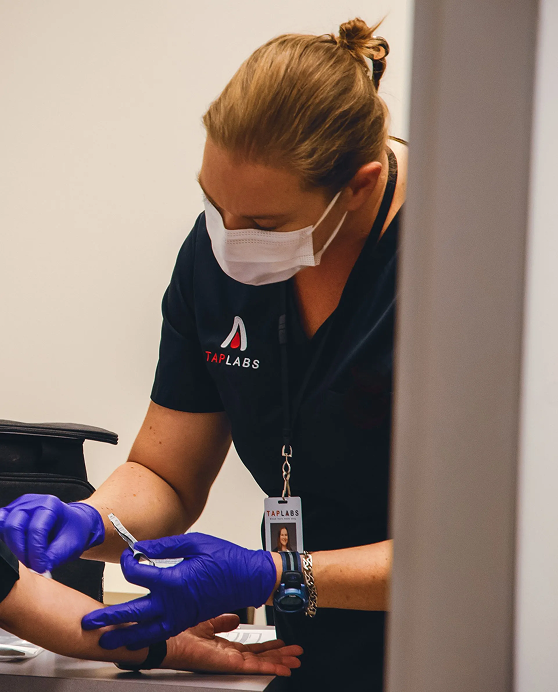Infertility: How stigma, stress and the lab system make the experience even more difficult for couples

Perspectives from a fertility clinic veteran
The journey to conceiving is rarely what it looks like in the movies. These picture-perfect portrayals cause many couples to expect a linear trajectory of planning, intimacy with a new purpose and a short while later, a tiny blue plus sign on a stick.
The reality is that conception experiences vary greatly. In Canada, one in five early pregnancies are lost to miscarriage, and roughly 16 percent — or one in six — couples experience infertility.
Tara Johnston, a medical lab technician with TapLabs, is very familiar with these challenges. Before joining the TapLabs team, she worked with Calgary’s Regional Fertility Program for nearly 20 years.
“Everyone has their own story and their own journey — it's very personal. It's heart-wrenching when you're trying to have a child and biology isn't letting you or there are other underlying circumstances.”
In Tara’s day-to-day at the fertility clinic, she saw patients at all stages of the journey; some couples had been trying for years with no success. Others were trying to find out why they were having repeated miscarriages, each one more devastating than the last. Many were further along in the process, undergoing fertility treatment like In-Vitro Fertilization (IVF).
The issues around infertility
Social stigma
Causes of infertility are as individual as the people experiencing it. And although more people are speaking up about their challenges, many couples still feel ashamed when they don’t conceive right away.
Tara says some of this stigma comes from a myth, perpetuated through the media and our culture in general, that easy pregnancy is the norm. Time and again, people have asked her, ‘We’ve been trying for three months and we're not pregnant. What's wrong with us?’
Tara wants people to know that there’s help out there. From counselling programs to support groups to Facebook pages — and of course the Regional Fertility Program — she’s seen more resources available today than ever before.
But because infertility is still stigmatized in our society, Tara goes above and beyond to let patients know she cares. During her two decades looking into the eyes of couples desperate to create their family, she’s learned how to help them feel safe, validated and supported — a skill that she brought with her to TapLabs.
Stress
Several recent studies have found links between stress and lowered chances of pregnancy. For example, in one study, women whose saliva had high levels of alpha-amylase, an enzyme that marks stress, took 29% longer to get pregnant compared to those who had less.
Tara has seen firsthand how stress can compound with each passing month, decreasing the chances of conception. The emotional, logistical, relational and financial stress feeds into a vicious cycle for many fertility patients.
Fertility treatments aren’t covered by Alberta Health Care, which means couples need to pay thousands of dollars out of pocket for IVF. Then there’s genetic testing, hormone panels, ultrasounds, doctors’ appointments and several rounds of blood work.
“The process is no joke. It puts you through a lot,” says Tara. "The emotions on top of all the financial stress, the physical stress, the medical stress…I can't even explain how much people go through.”

Bringing the fertility lab work to you
Fertility blood work is unique because it needs to be completed at specific times in a woman’s cycle. Anyone who’s gotten blood work done at a lab knows that the appointment needs to be booked weeks in advance. This usually means women are taking time out of their work day to wait for hours on end, adding even more stress to the process.
That’s where TapLabs comes in. Rather than waiting in a busy lab, TapLabs brings the blood work to the patient. When someone makes an appointment on the app, a professional medical lab technician like Tara will visit their home or workplace that same day, making the process much less stressful.
In fact, Kelly Kuzel, Co-founder of TapLabs started the company after her own experience waiting for hours in a lab during an ectopic pregnancy.
That’s also why Tara moved to TapLabs. She knew there had to be somewhere she could use her 20 years of experience working with fertility patients while also providing the highest standard of care.
“It's already a stressful time and blood work is not a comfortable situation. So having someone come in who’s a medical professional, who’s able to take their time and put the patient at ease — it just means we can give them the individualized care that they need.”
Tara hopes all couples experiencing infertility understand that it’s not uncommon, that they’re not alone and that there are resources out there. She hopes our society can end the stigma around infertility once and for all, and that those who want treatments are able to access it. Above all else, Tara wishes all people on a fertility journey receive the stress-free, compassionate care they deserve.
Let's Connect
Need assistance or ready to book? Send us a message, and our team will get back to you shortly.


